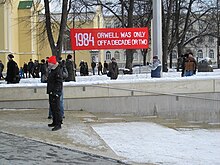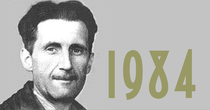Orwellian

| External videos | |
|---|---|
 | |
Orwellian is an adjective describing a situation, idea, or societal condition that George Orwell identified as being destructive to the welfare of a free and open society.[citation needed] It denotes an attitude and a brutal policy of draconian control by propaganda, surveillance, disinformation, denial of truth (doublethink), and manipulation of the past, including the "unperson"—a person whose past existence is expunged from the public record and memory, practiced by modern repressive governments. Often, this includes the circumstances depicted in his novels, particularly Nineteen Eighty-Four,[2] despite the narrative depicting a society in which only governmental employees are under repressive scrutiny, but political doublespeak is criticized throughout his work, such as in Politics and the English Language.[3]
The New York Times has said the term is "the most widely used adjective derived from the name of a modern writer".[4][5]
See also
[edit]References
[edit]- ^ Noah Tavlin. "What "Orwellian" really means". TED Ed. Retrieved 4 October 2015.
- ^ Drabble, Margaret (2000). The Oxford Companion to English Literature (Sixth ed.). Oxford and New York: Oxford University Press. p. 726. ISBN 0-19-861453-5.
- ^ Traub, James (5 January 2016). "The Empty Threat of 'Boots on the Ground'". The New York Times.
- ^ Nunberg, Geoffrey (22 June 2003). "Simpler Terms; If It's 'Orwellian,' It's Probably Not". The New York Times. ISSN 0362-4331. Retrieved 27 February 2018.
- ^ Jordison, Sam (11 November 2014). "Do you really know what 'Orwellian' means?". the Guardian. Retrieved 27 February 2018.
